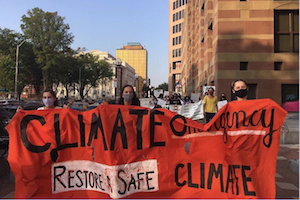
Three years ago on March 15, 2019, an estimated 1.4 million young people and supporters in 128 countries skipped school or work for what was then the largest youth-led day of climate protests in history. On Sept. 23, the fourth such youth-led global climate strike demanded that their leaders take urgent action to protect humanity and all living things from climate catastrophe.
In New Haven, Connecticut, high school students active in the local climate movement and some alumnae now in college led a rally around the city’s downtown Green and marched to City Hall where they conducted a die-in on the steps, sounding a drum once for each year of inaction on the climate since the 1992 Rio Climate Summit.
For the past several years, this youth group has promoted climate education, green jobs and renewable energy-fueled public transportation and electrification. Between The Lines’ Melinda Tuhus spoke with Patricia Joseph, an active member of the New Haven Climate Movement who graduated from high school last spring and is currently a first-year student at Yale University in New Haven. Here Joseph, who served as the Sept. 23 climate strike rally’s co-emcee, discusses her group’s recent actions and demands on city government to implement proactive climate policies.
PATRICIA JOSEPH: So, the New Haven Climate Movement is a grassroots organization, but what I think is unique is the Youth Action Team. We are predominantly youth-led, BIPOC (Black and indigenous people of color)-led and what we do is advocate for very bold government policies about climate change and climate action.
I think the climate crisis poses a lot of unique challenges, like sea-level rise, the fact there are a lot of low-income, BIPOC communities that will face the brunt of the climate crisis and we think New Haven can do so much more in mitigating the impacts of climate change, such as more community resilience programs, more accessibility to green jobs and transitioning to green jobs and just more jobs overall and realizing the impacts of climate change in New Haven.
As for our actions, we do plan rallies and protests as we saw with our Global Climate Strike last Friday. But we also do a lot of outreach, such as going to local farmers’ markets or community events and just starting this dialogue with local New Haveners on how we can better reduce our greenhouse gas emissions, what the government should do and how we can prioritize not only climate action, but climate justice as well.
MELINDA TUHUS: I know it was the New Haven Climate Movement that pushed the city to declare a climate emergency, which the city did in September of 2019. So often people work really hard to get a governmental body to declare a climate emergency and when they do, the government seems to think that’s the end, not the beginning. So how do you feel the City of New Haven is as a partner?
PATRICIA JOSEPH: With regard to partnering with any government institution, it’s really just about being annoying, like pestering and finding the right people to talk to. For instance, we talk about the 2019 climate emergency resolution and how we’re trying to push action forward. And so a lot of what we’ve been doing is referencing that in the emails and proposals we’ve been sending throughout the year, like to the mayor and Giovanni Zinn, the city engineer, with just a lot of updates and letters about the fact that they’re not doing enough and then we would coordinate meetings and get updates for certain projects and whether or not they’re getting a move-on, or what’s the problem with that and whether there’s enough staff or resources. And I think in that regard, it did lead to one of our major successes this year, which was getting $5 million allocated for the Carbon-Free Future program. The $5 million came from a bucket of the American Rescue Plan.
MELINDA TUHUS: And what does that look like?
PATRICIA JOSEPH: It really involves more community resiliency programs and the idea of electrification and what it looks like to have an energy-efficient home. That program actually opens up training specifically for people who want to work in energy efficiency and making jobs like that more accessible. We’re also working with an energy efficiency ethanol business that partners with a lot of New Haven homes that also makes energy efficiency resources available to New Haven homes.
Another part is just getting staff for the climate office. That’s a recurring demand of having a climate office and having two key point people there or several people who can get a move on with all the city departments, like transportation and turn these ideas into action.
MELINDA TUHUS: How does the New Haven Climate Movement connect making personal changes like riding the bus or eating less meat with structural changes that go beyond personal choices?
PATRICIA JOSEPH: Our 2023 campaign really emphasizes that individuals, organizations, as well as government institutions really take steps to reduce their greenhouse gas emissions. I think it really goes back to the fact that there may not seem to be a connection between riding your bike and a bold law coming into place.
But I think it’s also about thinking about all these actions, like the waste we accumulate, things we do that harm the earth ultimately come back to this idea of corporate greed and really being reliant on this system of corporate greed and not thinking about how your actions kind of perpetuate these systems of government policy. For instance, if more people ride their bikes, then the government can see that and this might mean we need to have more safe street infrastructure, we need to make sure that bike lanes are safe and implemented and in that way individuals and governments work together to make this change.
I think individual action shows institutions what policies need to be enacted, that a lot of people are taking a more environmentally conscious approach and that makes more sense for a policy to be passed when individuals are behaving in a more environmentally conscious way.
For more information visit the New Haven Climate Movement at newhavenclimatemovement.org.




